📞+86 153 7530 2641 📧 hongjing.Wang@feichuncables.com
AS/NZS 3191 Feichun Crane Cable: The Ultimate Basket Cable Solution for Modern Port Terminals
Feichun spreader cable offers a high-flex, durable solution for port crane basket systems. Designed for harsh marine environments, it delivers reliable performance for STS cranes and container terminals. Ideal for port engineers, crane OEMs, and terminal operators.
hongjing.Wang@Feichun
7/10/202516 min read
Introduction: Why Port Cranes Need High-Performance Spreader Cables
Modern port terminals operate under immense pressure to maximize throughput while maintaining exceptional reliability. At the heart of these operations lies the container spreader system, a critical component that directly interfaces with cargo containers during loading and unloading operations. Feichun spreader cable for port cranes has emerged as the definitive solution for the demanding requirements of these high-performance systems.
Port container spreaders operate in one of the most challenging industrial environments imaginable. These sophisticated mechanisms must perform thousands of lifting cycles daily, subjecting their electrical systems to violent dynamic movements, extreme mechanical stress, and harsh environmental conditions. The spreader carriage system moves rapidly up and down the crane's hoist mechanism, creating continuous flexing and bending forces on the power and control cables that supply these critical systems.
The frequency and intensity of spreader operations in modern container terminals cannot be overstated. A single Ship-to-Shore (STS) crane may perform over 30 container moves per hour during peak operations, with each move involving multiple spreader positioning cycles. This translates to hundreds of thousands of cable flexing cycles annually, far exceeding the capabilities of conventional cable designs.
Feichun's high-flexibility spreader cables are specifically engineered for port environments and spreader systems, addressing the unique challenges that have historically plagued container terminal operations. These cables represent a quantum leap in reliability and performance compared to traditional solutions, offering port operators the confidence needed to maintain continuous operations without the constant threat of cable-related failures.
This comprehensive guide is designed for port engineers, system integrators, and purchasing managers who understand that the right cable selection can make the difference between smooth operations and costly downtime. The information presented here provides the technical depth necessary to make informed decisions about spreader cable systems while highlighting the specific advantages that Feichun technology brings to modern port operations.
What Is Feichun Spreader Cable?
High-flex Feichun crane cable for spreader basket systems represents a specialized category of power and control cables engineered specifically for the demanding requirements of container handling equipment. These cables are designed to serve the critical connection between the crane's electrical systems and the spreader carriage, providing both power supply and control signal transmission in a single, robust solution.
The primary application areas for Feichun spreader cables include STS quay cranes, RTG (Rubber Tired Gantry) cranes, RMG (Rail Mounted Gantry) cranes, and other automated container handling equipment. These systems require cables that can simultaneously handle high-current power transmission for spreader motors and hydraulic systems while maintaining signal integrity for sophisticated control and positioning systems.
Feichun spreader cables support multiple functions within the spreader carriage system. Power supply capabilities include feeding electric motors for spreader positioning, twist-lock mechanisms, and auxiliary systems. Control signal transmission encompasses positioning feedback, load sensing, container detection, and communication with the crane's central control system. Data transmission capabilities support advanced features such as automated container identification, weight measurement, and diagnostic monitoring.
The construction of Feichun spreader cables reflects decades of engineering refinement and real-world testing in port environments. The conductor system employs ultra-fine stranded copper conductors with strand counts significantly higher than conventional cables. This fine stranding provides exceptional flexibility while maintaining excellent electrical conductivity and mechanical strength. The conductor design specifically addresses the fatigue issues that plague conventional cables in high-flex applications.
The insulation system utilizes advanced polymer compounds engineered for extreme flexibility and temperature stability. Unlike conventional PVC or rubber insulation materials, Feichun's proprietary insulation maintains its properties across the full operating temperature range while providing superior resistance to the mechanical stresses associated with continuous flexing operations.
The cable assembly incorporates multiple specialized layers designed to optimize performance in spreader applications. A flexible inner jacket provides primary protection for the conductor bundle, while specialized fillers maintain cable roundness and prevent conductor migration during flexing. The outer sheath system provides ultimate protection against environmental factors while maintaining the flexibility essential for spreader operations.
The low bending radius capability of Feichun spreader cables is particularly crucial for spreader basket applications. Traditional cables often require large bend radii that create space constraints and increase mechanical stress on the spreader carriage system. Feichun cables can accommodate much tighter bending radii without compromising performance or service life, enabling more compact and efficient spreader designs.
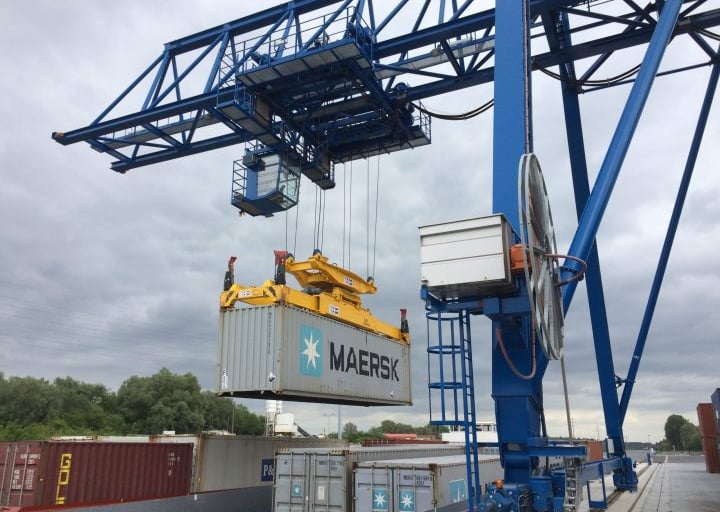

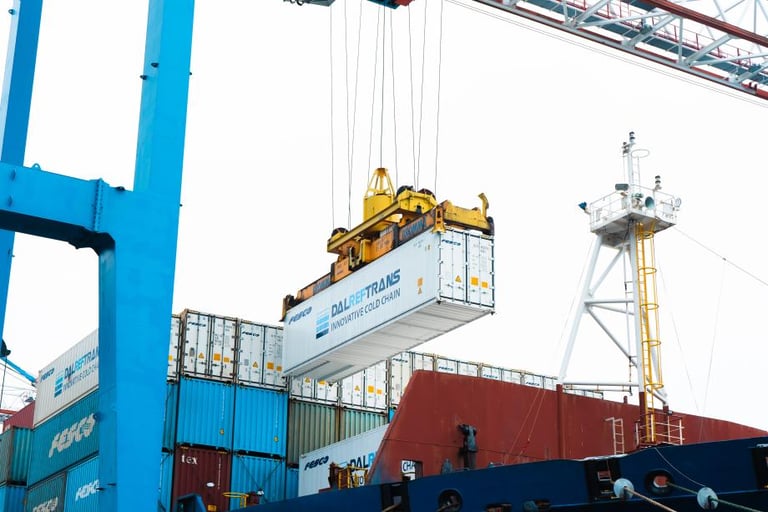

Key Features for Port Terminal Environments
Marine-grade flexible spreader cable Australia requires exceptional resistance to the harsh environmental conditions prevalent in coastal port facilities. The marine-grade jacket system employed in Feichun spreader cables provides comprehensive protection against salt spray, one of the most corrosive elements in port environments. The specialized polymer compounds used in jacket construction maintain their integrity even under continuous exposure to salt-laden atmosphere, preventing the cracking and degradation that commonly affects conventional cables.
Oil resistance is another critical requirement for port spreader cables. Container handling equipment utilizes various hydraulic fluids, lubricants, and cleaning agents that can attack conventional cable jackets. Feichun's marine-grade jacket demonstrates excellent resistance to these chemicals, maintaining its protective properties even after prolonged exposure to petroleum-based products commonly found in port operations.
UV resistance is essential for cables exposed to intense sunlight in outdoor port environments. The jacket materials incorporate UV stabilizers that prevent degradation from solar radiation, ensuring that cables maintain their mechanical properties and appearance throughout their service life. This UV protection is particularly important for spreader cables, which are often exposed to direct sunlight during operations.
The super flexibility characteristics of Feichun spreader cables represent a fundamental advancement in cable technology for port applications. These cables meet the demanding requirements of rapid spreader positioning and high-frequency winding operations that characterize modern container handling systems. The cable construction allows for millions of flexing cycles without the conductor fatigue or insulation cracking that limits the life of conventional cables.
The flexibility requirements for spreader cables extend beyond simple bending capabilities. The cables must accommodate complex three-dimensional movements as spreaders position themselves over containers, adjust for ship and dock movement, and navigate around obstacles. Feichun cables maintain their electrical and mechanical properties throughout these complex motion patterns, ensuring reliable operation in all spreader positioning scenarios.
Abrasion resistance is critically important for spreader cables that must survive in heavy-duty slide rail and drum systems. The outer sheath of Feichun spreader cables incorporates specialized compounds that provide exceptional resistance to mechanical wear. This abrasion resistance is tested under conditions that simulate years of operation in actual port environments, ensuring that cables maintain their protective properties throughout their design life.
The working temperature range of -40°C to +90°C ensures that Feichun spreader cables can operate reliably in all climate zones found in Australia and other global port locations. This wide temperature range is achieved through careful selection of materials and construction techniques that maintain cable performance across temperature extremes. The cables maintain their flexibility even at low temperatures while providing stable electrical properties at high temperatures.
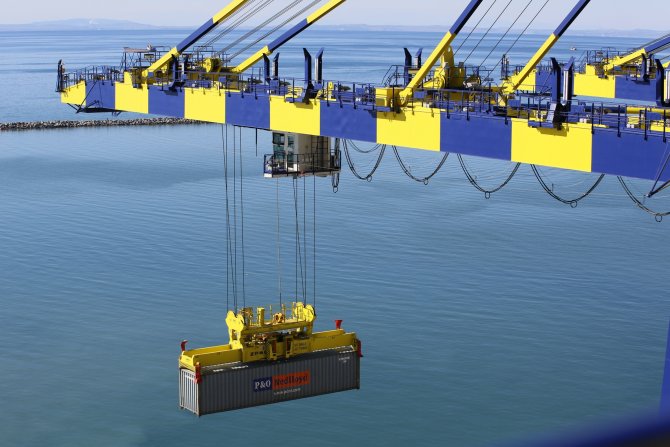


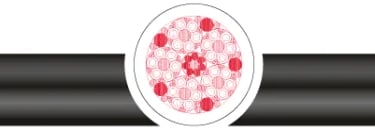
Conductor material:Bare copper strand, extremly fine stranded
Core insulation:Rubber compound
Stranding:Cores stranded in bundles
Overall stranding:Bundles stranded in layers
Outer sheath:PUR
Sheath colour:Black
Rated voltage:Uo/U: 0,6 / 1 kV
Testing voltage:3,5 kV
Current-carrying-capacity:Acc. to DIN VDE, see Technical Guideline
Min. bending radius fixed:Acc. to DIN VDE 0298 part 3
Min. bending radius moved:Acc. to DIN VDE 0298 part 3
Operat. temp. fixed min/max:-50 °C / +80 °C
Operat. temp. moved min/max:-40 °C / +80 °C
Temp. at conductor:+90 °C
Resistant to oil:Acc. to EN 60811-404
Standard:Similar to DIN VDE 0250
Where Feichun Spreader Cables Are Used
STS (Ship-to-Shore) spreader basket carriage systems represent the most demanding application for port spreader cables. These massive cranes handle the largest container vessels in the world, requiring spreader systems that can position containers with millimeter precision while operating at high speeds. The spreader carriage system travels vertically along the crane's hoist mechanism, creating continuous flexing and bending forces on the power and control cables.
In STS applications, Feichun spreader cables must handle the full range of spreader functions including main hoist motors, auxiliary positioning systems, twist-lock mechanisms, and sophisticated control systems. The cables must maintain signal integrity for precise positioning feedback while carrying high currents for motor drives. The marine environment adds additional challenges with salt spray, wind loading, and temperature extremes that would quickly degrade conventional cable systems.
RTG and RMG automated gantry crane spreader power supply systems present unique challenges for cable design. These cranes operate in container yards where spreader cables must accommodate the complex three-dimensional movements required for precise container stacking. The automated nature of these systems demands exceptional reliability, as cable failures can halt operations across multiple crane lanes.
The power supply requirements for RTG and RMG spreader systems include high-current feeds for main positioning motors, power for hydraulic systems, and supply for auxiliary equipment such as container scanning systems and positioning sensors. Control signal requirements encompass feedback from multiple positioning systems, load cells, and safety interlocks that ensure safe operation in automated environments.
Smart container spreader control systems represent the cutting edge of port automation technology. These advanced systems incorporate features such as automated container identification, precise weight measurement, and real-time performance monitoring. The cable systems supporting these smart spreaders must provide high-speed data transmission capabilities while maintaining the power and control functions of traditional spreader systems.
The data transmission requirements for smart spreader systems include high-speed communication protocols for real-time control, diagnostic data streams for predictive maintenance, and integration with terminal management systems. Feichun spreader cables incorporate specialized shielding and conductor configurations that ensure signal integrity even in the electrically noisy environment of port operations.
Mobile crane signal and power connections require spreader cables that can accommodate the unique movement patterns of these versatile machines. Mobile cranes often operate in multiple areas of the port, requiring cables that can handle frequent setup and breakdown cycles while maintaining reliable connections for spreader operations.
Why Choose Feichun Over Conventional Cables?
The superiority of Feichun spreader cables over conventional PVC and rubber cables becomes apparent when examining their performance characteristics under real-world operating conditions. Traditional cables typically exhibit limited flexibility and poor resistance to the mechanical stresses associated with continuous flexing operations. The rigid construction of conventional cables creates stress concentrations that lead to premature failure, often within months of installation in demanding spreader applications.
Feichun spreader cables demonstrate significantly softer handling characteristics and dramatically extended service life compared to conventional alternatives. The advanced conductor design and specialized insulation materials allow these cables to maintain their electrical and mechanical properties through millions of flexing cycles, far exceeding the capabilities of traditional cable designs.
The prevention of spreader failure and port shutdown due to cable breakage represents one of the most significant advantages of Feichun technology. Cable failures in spreader systems can halt operations across multiple crane lanes, resulting in costly delays and missed vessel schedules. The improved reliability of Feichun spreader cables reduces the risk of these catastrophic failures, providing port operators with the confidence needed to maintain aggressive operating schedules.
The economic impact of cable reliability in port operations cannot be overstated. A single STS crane may handle over $100 million worth of cargo annually, making the cost of downtime far exceed the investment in premium cable systems. Feichun spreader cables provide the reliability needed to protect these substantial investments while minimizing maintenance costs and operational disruptions.
Feichun's approach to cable design incorporates precise structural engineering and strict quality testing protocols that ensure long-term stable operation. Each cable design undergoes extensive testing under conditions that simulate years of actual port operation, including accelerated life testing, environmental exposure testing, and mechanical stress testing. This comprehensive testing program ensures that cables meet or exceed their design specifications throughout their service life.
The quality assurance program for Feichun spreader cables includes incoming material inspection, in-process testing, and final product validation. Each cable is tested for electrical continuity, insulation resistance, and mechanical integrity before shipment. This rigorous quality control ensures that every cable meets the demanding requirements of port spreader applications.
Compliance & Certifications
Feichun spreader cables comply with comprehensive international standards that ensure safety, reliability, and performance in port applications. IEC 60228 provides the foundational requirements for conductors used in power and control cables, establishing standards for conductor construction, electrical properties, and mechanical characteristics. Compliance with this standard ensures that Feichun cables provide consistent electrical performance and mechanical reliability.
IEC 60332 addresses the flame propagation characteristics of cables, ensuring that Feichun spreader cables meet strict fire safety requirements. This standard is particularly important for port applications where cables may be installed in enclosed spaces or areas where fire safety is a critical concern. The flame-retardant properties of Feichun cables help prevent the spread of fire in the event of an electrical fault.
AS/NZS standards provide additional requirements specific to Australian and New Zealand applications, ensuring that Feichun spreader cables meet local regulatory requirements while maintaining compatibility with international standards. These standards address the unique environmental conditions found in Australia and New Zealand, including extreme temperature variations and high UV exposure levels.
The compatibility of Feichun spreader cables with drum systems is validated through comprehensive bending test reports that demonstrate the cables' ability to withstand the mechanical stresses associated with cable reel operations. These tests simulate the actual operating conditions found in port spreader systems, including the continuous winding and unwinding operations that occur during normal crane operations.
Drag chain compatibility testing ensures that Feichun cables can operate reliably in linear motion systems commonly used in automated port equipment. These tests validate the cables' ability to withstand the unique mechanical stresses associated with drag chain operations, including the accordion-like flexing patterns that occur during linear motion.
Environmental certifications including RoHS and REACH compliance ensure that Feichun spreader cables meet strict environmental requirements for material content and manufacturing processes. These certifications are increasingly important for port operators who must comply with environmental regulations and sustainability requirements.
Low smoke and halogen-free options are available for applications where fire safety requirements demand minimal smoke generation and non-toxic gas emissions. These specialized formulations maintain the performance characteristics of standard Feichun cables while providing enhanced safety features for enclosed spaces and areas with strict fire safety requirements.
Feichun in the Australian Port Market
The Australian port market presents unique challenges and opportunities for spreader cable applications. Major Australian ports including Melbourne Port and Fremantle Port operate some of the most advanced container handling equipment in the world, requiring cable systems that can meet the demanding requirements of these sophisticated operations.
Feichun has successfully deployed spreader cable systems in multiple Australian port installations, demonstrating the technology's ability to perform reliably in the challenging conditions found in Australian coastal environments. These installations have provided valuable real-world validation of the cables' performance characteristics and have contributed to ongoing product development and refinement.
The extreme weather conditions found in Australia, including intense UV exposure, high temperatures, and severe storms, create particularly demanding operating conditions for port equipment. Feichun spreader cables have demonstrated their ability to maintain reliable operation throughout these extreme conditions, providing port operators with the confidence needed to maintain continuous operations.
Melbourne Port, one of Australia's largest container terminals, has implemented Feichun spreader cable systems across multiple STS cranes and automated container handling systems. The successful deployment of these systems has demonstrated the cables' ability to maintain reliable operation in high-volume container handling operations while providing the flexibility needed for efficient cargo movement.
Fremantle Port's adoption of Feichun spreader cable technology has provided valuable insights into the cables' performance in Western Australia's unique environmental conditions. The port's experience with these cables has validated their ability to maintain reliable operation in high-temperature, high-UV environments while providing the mechanical durability needed for continuous operations.
The local adaptation of Feichun spreader cables for Australian conditions includes modifications to jacket materials and construction techniques that optimize performance for local environmental conditions. These adaptations are combined with international standard compliance to ensure that the cables meet both local requirements and global performance standards.
The dual guarantee of local adaptation and international standard compliance makes Feichun spreader cables suitable for both domestic Australian installations and export projects. This flexibility is particularly valuable for port operators and crane manufacturers who must meet diverse requirements across multiple markets.
Choosing the Right Feichun Spreader Cable
The selection of appropriate Feichun spreader cables requires careful consideration of the specific electrical and mechanical requirements of each application. Voltage range selection is fundamental to ensuring safe and reliable operation, with common options including 300/500V for control and auxiliary systems and 0.6/1kV for main power applications.
The 300/500V rating is typically used for control cables that carry positioning signals, feedback information, and low-power auxiliary systems. These cables must maintain excellent signal integrity while providing the flexibility needed for continuous spreader operations. The 0.6/1kV rating is used for main power cables that supply spreader motors and other high-current systems.
Conductor specifications for Feichun spreader cables can be customized to meet specific application requirements. Common configurations include 18G1.5mm² for control applications and 24G2.5mm² for power applications, though custom configurations are available to meet unique requirements. The conductor count and size are selected based on the specific electrical loads and control requirements of each spreader system.
The choice of conductor configuration depends on the specific functions that must be supported by the spreader cable system. Power conductors must be sized to handle the current requirements of spreader motors and auxiliary systems, while control conductors must provide reliable signal transmission for positioning and feedback systems.
Steel wire core reinforcement is available for applications where additional tensile strength is required. This reinforcement is particularly important for long vertical cable runs where the cable's own weight could create excessive stress on the conductors. The steel wire core provides mechanical support while maintaining the cable's flexibility characteristics.
Shielding layers are available for applications where electromagnetic interference (EMI) protection is required. Port environments often contain significant sources of electrical noise, including large motors, variable frequency drives, and radio communication systems. Shielding helps ensure that control signals maintain their integrity in these electrically noisy environments.
Anti-torsion structures are available for applications where the spreader cable must resist twisting forces during operation. These structures help maintain the cable's electrical properties and prevent mechanical damage that could result from excessive twisting during spreader operations.
Common Problems and Solutions in Port Spreader Cable Applications
Q: Why do conventional cables fail prematurely in spreader applications? A: Conventional cables fail prematurely in spreader applications due to inadequate design for the extreme mechanical stresses encountered in these systems. Standard cables are designed for stationary installations and cannot withstand the millions of flexing cycles required in spreader operations. The conductors in conventional cables are too coarse, causing stress concentrations that lead to conductor breakage. The insulation materials are too rigid, creating cracking and failure under continuous flexing. Feichun spreader cables address these issues through ultra-fine stranded conductors and specialized flexible insulation materials that maintain their properties throughout millions of flexing cycles.
Q: How do environmental conditions in ports affect cable performance? A: Port environments subject cables to a combination of harsh conditions including salt spray, UV radiation, temperature extremes, and chemical exposure. Salt spray is particularly destructive, penetrating cable jackets and corroding conductors and shields. UV radiation causes polymer degradation, leading to jacket cracking and brittleness. Temperature cycling creates expansion and contraction stresses that can damage cable structures. Chemical exposure from hydraulic fluids and cleaning agents can soften or crack conventional cable jackets. Feichun spreader cables incorporate marine-grade jackets and specialized materials that resist these environmental factors, maintaining their protective properties throughout their service life.
Q: What causes signal interference in spreader control systems? A: Signal interference in spreader control systems typically results from electromagnetic interference (EMI) generated by large motors, variable frequency drives, and other electrical equipment operating in the port environment. Inadequate shielding in conventional cables allows this interference to corrupt control signals, leading to positioning errors and system malfunctions. Poor grounding practices can also create ground loops that introduce noise into control circuits. Feichun spreader cables incorporate comprehensive shielding systems and proper grounding techniques to minimize EMI effects and ensure reliable signal transmission.
Q: How can ports minimize spreader cable maintenance costs? A: Minimizing spreader cable maintenance costs requires selecting cables specifically designed for the demanding requirements of spreader applications. While premium cables like Feichun systems have higher initial costs, their extended service life and improved reliability result in lower total cost of ownership. Implementing proper cable management practices, including appropriate bend radii and support systems, can significantly extend cable life. Regular inspection programs can identify developing problems before they result in failures. Keeping spare cables in inventory reduces downtime when replacements are needed.
Q: What are the key considerations for spreader cable installation? A: Proper installation is crucial for maximizing spreader cable performance and service life. Cable routing must minimize stress concentrations and avoid sharp bends that could damage the cable structure. Support systems must be designed to accommodate the dynamic movements of the spreader system without creating excessive stress on the cable. Termination techniques must ensure reliable connections that can withstand the mechanical forces encountered in spreader operations. Environmental protection at termination points is critical to prevent moisture ingress and corrosion. Proper cable management systems help organize multiple cables and prevent tangling during spreader operations.
Q: How do you select the right cable configuration for specific spreader requirements? A: Selecting the right cable configuration requires a thorough understanding of the spreader system's electrical and mechanical requirements. Power requirements must be analyzed to determine conductor sizes and voltage ratings. Control signal requirements must be evaluated to determine the number and type of control conductors needed. Environmental conditions must be considered to select appropriate jacket materials and protection levels. Mechanical requirements including bending radii and flexing cycles must be evaluated to ensure the cable can withstand the operating conditions. Working with experienced cable manufacturers like Feichun ensures that all these factors are properly considered in the cable selection process.
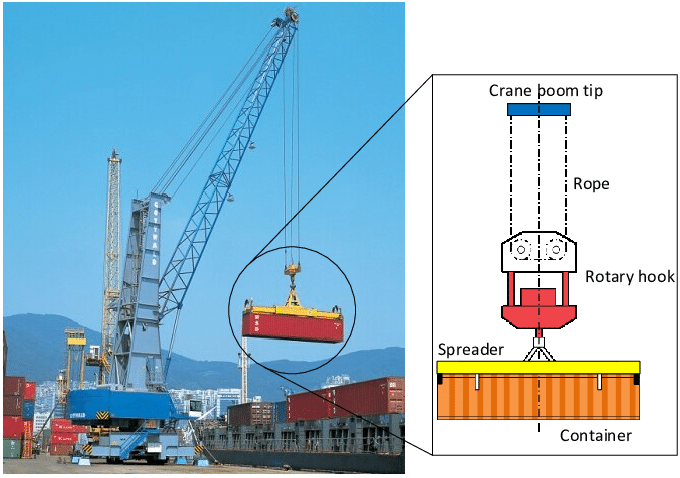

Technical Support and Engineering Services
Feichun provides comprehensive technical support services to ensure optimal cable selection and installation for port spreader applications. CAD wiring solution services include detailed drawings and specifications that facilitate proper cable installation and routing. These services help ensure that cables are installed in configurations that maximize performance and service life while meeting all safety and regulatory requirements.
Technical selection support services provide expert guidance in choosing the right cable configuration for specific spreader applications. Feichun's engineering team works closely with port operators and crane manufacturers to understand the unique requirements of each installation and recommend cable solutions that optimize performance and reliability.
The engineering consultation services include analysis of electrical loads, mechanical requirements, and environmental conditions to ensure that selected cables meet or exceed all application requirements. This comprehensive approach helps prevent costly mistakes and ensures that cable systems provide reliable operation throughout their design life.
Conclusion and Call to Action
The demanding requirements of modern port spreader systems necessitate cable solutions that can deliver exceptional performance, reliability, and longevity in harsh marine environments. Feichun spreader cables represent the culmination of decades of engineering expertise and real-world testing in port applications, providing the advanced performance characteristics needed for today's sophisticated container handling systems.
The comprehensive feature set of Feichun spreader cables, including marine-grade environmental protection, exceptional flexibility, and robust construction, makes them the ideal choice for port operators seeking to maximize equipment reliability while minimizing maintenance costs. The proven performance of these cables in major Australian ports demonstrates their ability to meet the demanding requirements of modern container terminal operations.
For port engineers, crane manufacturers, and terminal operators seeking to optimize their spreader cable systems, Feichun provides the technical expertise and product performance needed to ensure successful installations. The combination of advanced cable technology, comprehensive technical support, and proven field performance makes Feichun spreader cables the preferred choice for demanding port applications.
Take Action Today:
Request Project Consultation: Contact Feichun's engineering team to discuss your specific port project requirements and receive expert recommendations for optimal cable selection. Our technical specialists can provide customized solutions that meet your unique operational requirements.
Get Comprehensive Solutions: Feichun provides complete wiring solutions and technical consultant support for spreader slide systems, ensuring that all aspects of your cable installation are properly designed and executed for maximum performance and reliability.
The investment in premium spreader cable technology pays dividends through reduced maintenance costs, improved operational reliability, and extended equipment life. Contact Feichun today to discover how advanced spreader cable technology can optimize your port operations and protect your valuable container handling investments.
Transform your port operations with Feichun spreader cable technology - where engineering excellence meets operational reliability.
How to Reach Us
Get in Touch
SiteMap
Product Catalogue
Reeling Cable
Festoon Cable
Shore Power Cable




Scan to add us on WeChat
